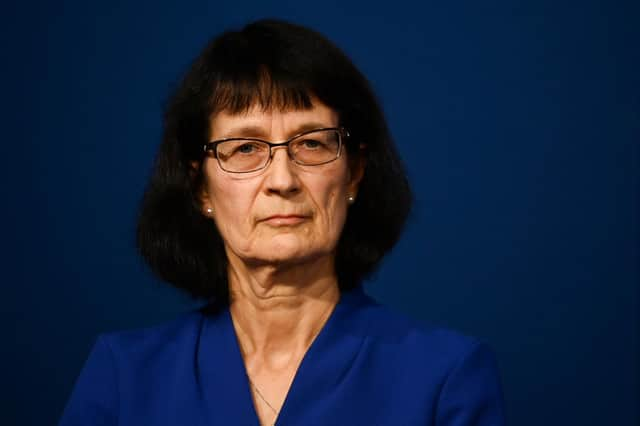'Glimmer of Christmas hope' from findings Omicron is milder form of Covid


But UK Health Security Agency chief executive Dr Jenny Harries warned that it was too early to downgrade the threat from the variant, which is still spreading rapidly across the UK.
Dr Harries told BBC Radio 4’s Today programme that more information is needed, particularly about the impact on elderly and more vulnerable patients.
Advertisement
Hide AdAdvertisement
Hide AdShe added: “There is a glimmer of Christmas hope in the findings that we published yesterday, but it definitely isn’t yet at the point where we could downgrade that serious threat.”
The UKHSA estimates that someone with Omicron is between 31% and 45% less likely to attend A&E and 50% to 70% less likely to be admitted to hospital than an individual with the Delta variant.
The rapid spread of Omicron has seen it become the “dominant strain now right across the UK”, and Dr Harries said cases were still doubling across “most regions” of the country.
She added: “What we have got now is a really fine balance between something that looks like a lower risk of hospitalisation – which is great news – but equally a highly transmissible variant and one that we know evades some of our immune defences, so it is a very balanced position.”
Advertisement
Hide AdAdvertisement
Hide AdThe health agency’s analysis came as the UK experienced yet another record-breaking number of daily reported Covid cases, with 119,789 reported as of 9am on Thursday.
This was the second day in the whole of the pandemic that daily lab-confirmed case rates were above 100,000, after Wednesday.
Dr Harries said key pieces of information about Omicron are still needed to understand how much of a risk it poses to the health service, such as average length of stay in hospital.
She added: “We’re not seeing very significant rises in intensive care utilisation or in the use of ventilation beds.
Advertisement
Hide AdAdvertisement
Hide Ad“Now that may be because a lot of the people who’ve been infected to date are actually younger people and we will see that coming through.”
But if the severity of the disease is actually “significantly lower than Delta”, then some of the impact on the NHS may be less severe, she said.
Dr Harries also suggested the Government might consider whether new restrictions are needed in England based on the wider impact of the Omicron wave, rather than just the severity of the illness.
Boris Johnson has not imposed any further restrictions for England over Christmas, but has indicated he will not hesitate to act afterwards – with Monday expected to be the first opportunity to consider if changes are needed.
Advertisement
Hide AdAdvertisement
Hide AdAsked whether the Government would have the information on Monday to make key decisions, Dr Harries said: “Ministers will look at all of the data that we have available and that isn’t simply what the epidemiology is saying, it’s how it’s impacting society.
“So for example, we have very high rates of individuals off sick – we know that particularly in London, around one in 35 have currently got Omicron.
“Now that’s having an impact on the workforce. So these are not simply about hospitalisation rates.”
She added that ministers were being kept updated on a daily basis and that would continue throughout the Christmas period.
Advertisement
Hide AdAdvertisement
Hide Ad“I don’t think we do know yet that this is going to be a significantly less serious disease for the population – the older population – that we are normally most concerned about in relation to serious disease and death,” she said.
Her comments come after Mr Johnson used his Christmas message to urge people to come forward to get a Covid booster jab as part of the “neighbourly” spirit of the season.
In his message to the nation released on Friday, the Prime Minister said: “Though the time for buying presents is theoretically running out, there is still a wonderful thing you can give your family and the whole country, and that is to get that jab, whether it is your first or second, or your booster.”
He added: “We have been getting that vaccination that protects us and stops us infecting others.
Advertisement
Hide AdAdvertisement
Hide Ad“And I hope I can be forgiven for taking pride in the immense spirit of neighbourliness that the people of this country have shown.
“Getting jabbed not just for themselves, for ourselves, but for friends and family and everyone we meet.”
In Scotland, First Minister Nicola Sturgeon also used her Christmas message to urge people to get vaccinated, describing the booster campaign as “a source of brightness during a really difficult month”.
In Northern Ireland, DUP leader and Lagan Valley MP Sir Jeffrey Donaldson said that Covid “should not be underestimated” as he isolates with the infection.
Read more:
Comment Guidelines
National World encourages reader discussion on our stories. User feedback, insights and back-and-forth exchanges add a rich layer of context to reporting. Please review our Community Guidelines before commenting.